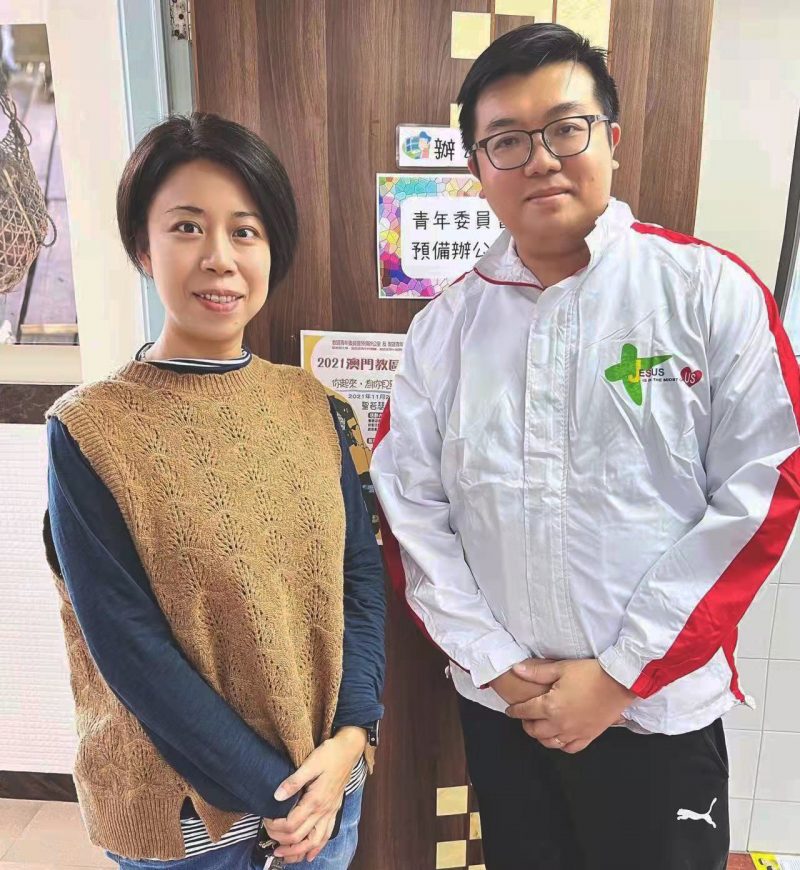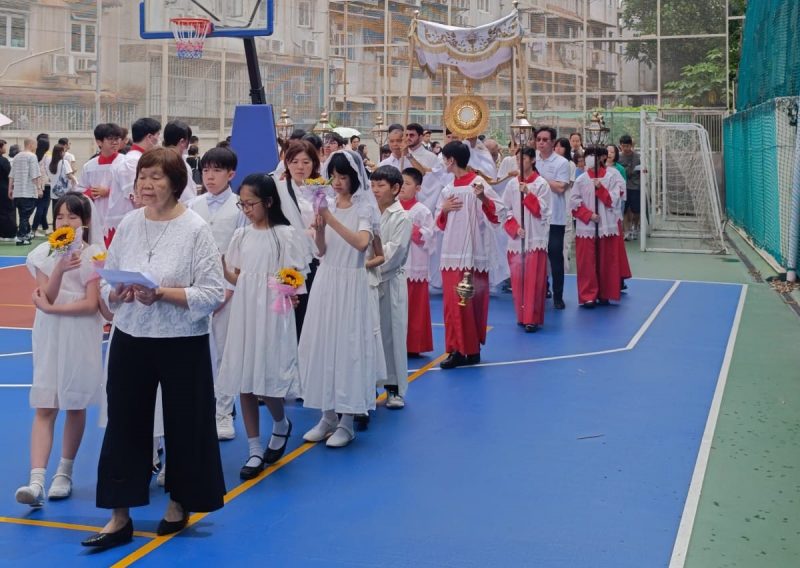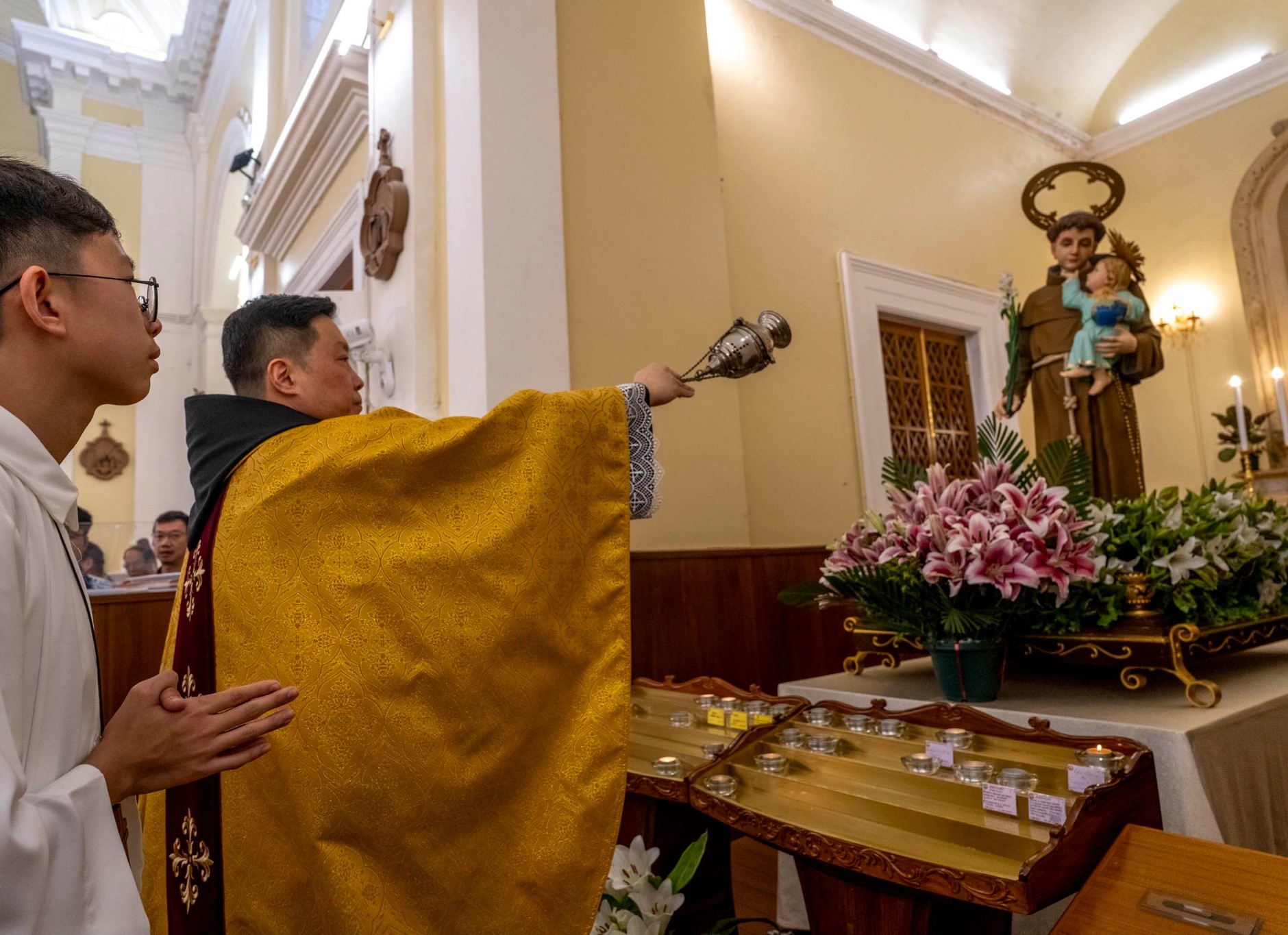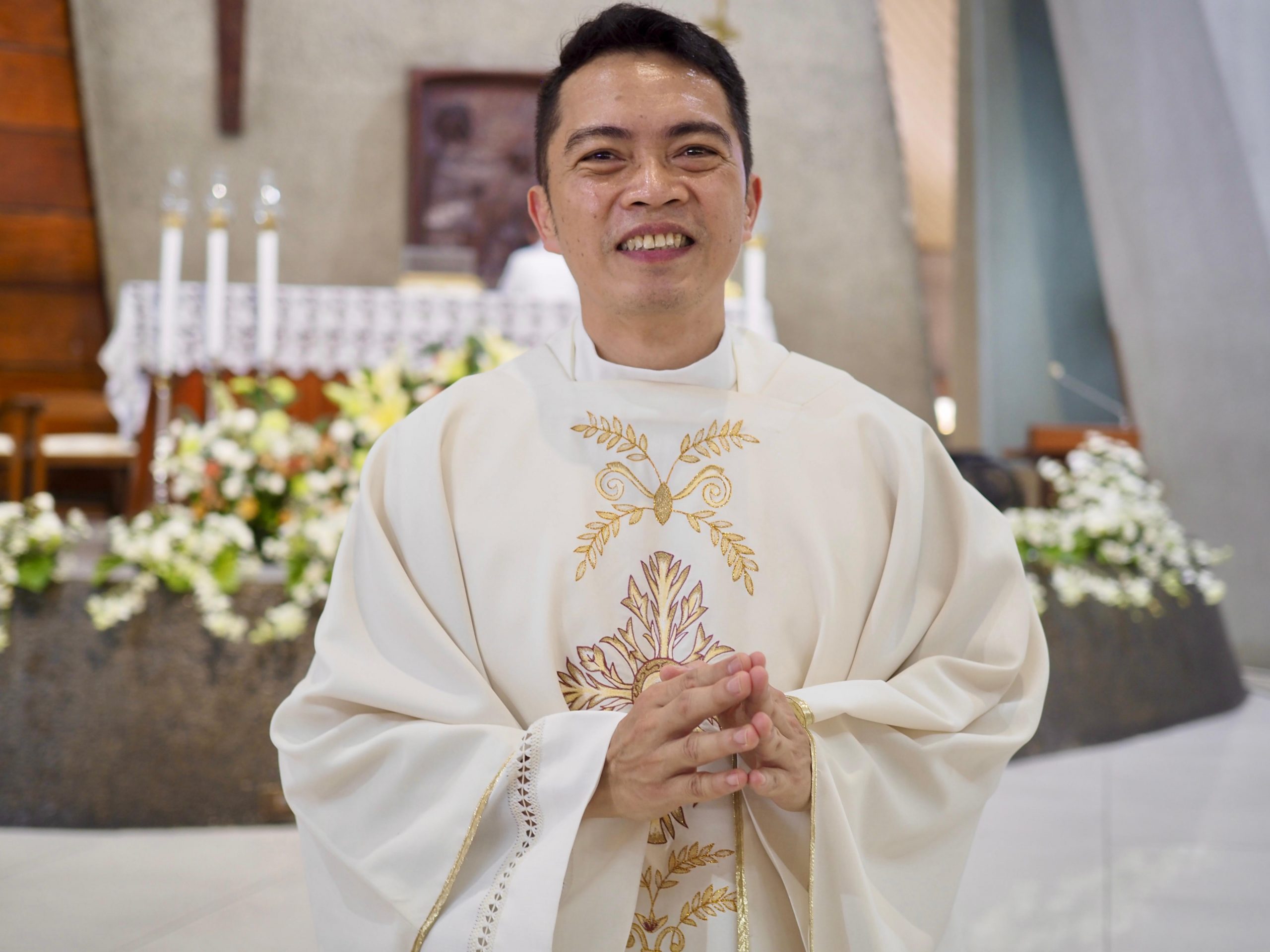The Macau Diocese held the Macau Diocesan Youth Day on 27th November Saturday and establish the Diocesan Youth Commission, responsible for organizing the Youth work in the Diocese. O CLARIM interviewed the Supervisor of the Diocesan Youth Commission Mr. Bosco Wong and Vice Supervisor Ms. Tammy Chiu, to share about the future mission and the work of the Diocesan Youth Commission.
- What is the function of the Diocesan Youth Commission?
Mr. Wong: The main function of our committee is to serve as a bridge between the youth and the Diocese. Our committee has five missions: 1) to promote the vocation of Macau’s Catholic youth, 2) to unite the strength of Macau’s Catholic youth, 3) to encourage Macau’s youth to draw closer to Christ and to promote their relationship with God, 4) to enable Macau’s youth to develop their talents, 5) to strengthen the ability of Macau’s youth to care for society and to build positive civic values and a sense of identity.
We will assist the Diocese to implement work with the youth, nurture the youth leaders, pay special attention to the spiritual needs of the youth, provide positive support and accompany the youth, organizing and representing the Diocese of Macau in worldwide or regional youth activities.
We will set up a Youth Centre in the future to provide them a comfortable place for group gatherings, to hold different activities, and communicate with the youth through social media.
Chiu: The Diocesan Youth Commission is a Diocesan organization, and I think its greatest function is to promote and coordinate youth work and youth activities and to enable youth to grow in the Church.
- What is the difference between Diocesan Youth Commission and Comissão Diocesana Preparatória do Ano da Juventude? Is there any difference between the functions of the two?
Mr. Wong: The Diocesan Youth Commission is the passing on and continuity of Comissão Diocesana Preparatória do Ano da Juventude.
Chiu: The major difference between the two is that the Diocesan Youth Commission is a formal commission with a long-term development in the Diocese. The Comissão Diocesana Preparatória do Ano da Juventude, on the other hand, is a response to the invitation of Pope Francis to pay more attention to youth work at the respective Diocesan level, under the leadership of Bishop Lee, who has set up a three-year Preparatory Committee, and during this three-year period, it will carry out work for youth and gather youth representatives from different parishes and groups.
- Your target audience is the youth, but there are different age groups of the youth, so how do you define them?
In the Youth Policy of the Macau SAR Government, it defines the youth age group from 13 to 35 years old. We think that if we implement youth work in the diocese, it will be somewhat consistent with the youth work promoted by society and the Government, and we basically follow this age range.
However, there is a wide range of ages from 13 to 35, and we have found that (on average) 13 to 18 years old are secondary school students, 18 to 22 years old are university students, and 23 to 35 year old are working youth, who may have entered the workforce or just started another stage of life, such as organizing a family, long-term development at work, job position, etc. The needs of different groups of people are different, so we will focus on the different aspects such as, for example, the secondary group, the university group, the working youth group. The Diocesan Youth Commission members are from different fields. They will be more familiar with the different needs to the youth of all ages.
- Following the previous question, different age groups have different thoughts and needs, and their nurturing is also different, how could the Diocesan Youth Commission meet the needs of different ages?
Mr. Wong: It is a good question, our concept is young people accompany young people. We focus on the nurturing of the youth leaders. We hope that dedicated and enthusiastic young people, after systematic training, could become a youth leader who could lead others to know Jesus Christ better and come closer to God. And the young leaders we are nurturing – as Pope Francis has said “to dream with courage, to live with Jesus in our hearts, and to overcome life’s difficulties together” these characteristics to become a youth leader, is a service leader. From the level of accompaniment, the secondary school group will organize some activities such as growth groups, sports fellowship, and career planning. For the University youth, the focus is the sharing of the life of faith and youth leadership. For the working youth, we would focus on topics such as life sharing and the choices of life, the call of life, so that faith could support our lives.
Youth is a calling, the vocation will always present in our lives. Helping young people to know themselves and their faith, is the most important work of our committee.
- Have you worked with youth in the past? Based on your experience, what do you think is the most important thing that youth need?
Chiu: I have been working in Centro Pastoral Diocesano da Juventude for 15 years and previously I have joined the volunteer work and have been working with the youth for 10 years. Among the people I have contacted, there are also high school students, university students, working youths, and young parents who have become parents. I think they all need different “people” to accompany them in different stages.
Since we ourselves are a Catholic community, and these friendships are based on the community of faith, we must place great emphasis on building community with them. And in the community where they meet with different people, they naturally find some like-minded people with similar personalities and develop friendships. These people will also keep encountering and even walking with each other in their future. They will find themselves, find Jesus Christ, find God in the people of the community. This is one of our greatest hopes for our youth. My experience told me that no matter what activities that are hold, in Macau or overseas, they may forget the content of these activities, but they will never forget the “people” and some special “events” they participated together. I think these are shared experience. Young people need a lot of different people to walk with them, and they need some opportunities to be encouraged and supported. The experience of encouragement and companionship is very important.
Wong: Thanks to God, I have always participated in volunteer activities and met many young people. After graduating from the university, I worked as an educator, as a primary school teacher, and I had more contact with more young people. Until last year I have an opportunity to work with young people in the Comissão Diocesana Preparatória do Ano da Juventude, to know more young people. I think what they need the most is companionship. And this companionship is not the companionship of an educator, but of a peer. It is like telling a story to a child, do I tell the story to them face to face like an educator, in a lecturing way or do I sit next to them and tell the story? I believe that the companionship of youth is to be there with them, to tell them stories, to think with them about their ideas, and to make those ideals and ideas become a reality.
- The youth of Macau are more introverted, what do you think are the ways to promote them? What are the ways to reach out to these “sheep”?
Wong: Yes, it is true that the youth of Macau is quieter and hidden themselves, but in fact I think they have a lot of ideas inside, but they have a lot of things to worry about in their lives and studies. The greatest conflict in our lives is whether we should do what is “urgent but not important” or what is “not urgent but important.” In my opinion, I think that working with young people in Macau is about accompanying them, letting them feel and guide them to judge the urgency and importance of things. For example, it could be their calling, vocation, or in faith, letting them know God is waiting for us. These are not very urgent things, but very important, and they need peers to face them together. We will use these concepts to become an activity to let them feel and know these are important things (faith) in our lives and is needed to be elevated.
Chiu: I have different point of view towards the youth of Macau who are considered as introvert, because there are lots of things and activities attracting them in the environment of Macau. We need to re-examine whether the language and activities in the church are appealing to them. That’s why we must go into their world, to see what their needs are, since different age group have different needs. The youth have different level of wants, I think that youth work requires a lot of time to understand and let them to speak out about their needs. In my previous youth work, I have contacted with many non-Catholics, whether they are Catholics or not, their ideas and desires are the same. In addition to different levels of young people, have different concerns, that’s why we should meet their needs and desires. But what sets us apart from other youth group is our faith. We focus more on the scope of faith, and through soft approaches and activities, we will satisfy their spiritual needs and desires through faith.
- We often say that young people are the future, however, some young people feel pressured to do so. What do you think society, or the Diocese could expect from the young people?
Chiu: I believe that young people is not about future, is about “present.” If we do not think about the youth and care about them, if we don’t provide them with more resources and opportunities, if there is no platforms for them to develop, we won’t have the youth of the future. If said young people are the future, however, some young people feel pressured, I think that we have not done a good job of psychological preparation for them in the early stages. Why they feel stressed, maybe they keep on doing and have not been taking seriously, or have been very demanding to them, but not listening to their ideas and response. They may also have requirements for the church. If we only think of them as the future pillars of society and the church and give them different resources, then we need to stop and ask: What do the young people really need? The young people are available now, if we do not have these young people at present, we simply do not have the building blocks of the future.
Wong: I think it’s a two-way process. It is true that we often say that “young people are the future of the church and society,” and even if we say it explicitly or not, it is an undeniable fact that they are definitely the “future,” as for me, more importantly, they are the “present” of the society and is the same as what Tammy said. I think they are under pressure because of the unknown that is far away and far in the future. However, “future” is also the same as “possibility”, so young people need to learn to see this “possibility” and to live truthfully in the “present” through their own efforts and through the presence of the church. Our role is to support them, for example if they like to create, we organize some activities for them to develop, I think these “present” are the way to prepare for the path of the future.
- What do you expect youth to get out of the Diocesan Youth Commission?
Wong: We hope the youth could see our strength and belief in the Diocesan Youth Commission, just like the logo of the committee, there are three people. These three people are peer and partners who support each other on the way of growth. I hope they will diversify the activities in the future, because the youth themselves are diversified, through the activities they will know Jesus Christ and find God, and hope that they will find the calling in their lives.
Chiu: I don’t think about what the youth get out of the Diocesan Youth Commission, but rather how the committee can contribute to our own professions because they are all from different background, and I think the youth can see in them that the Church is not biased towards one profession or service, but that they come from different backgrounds and can share together. We all hope to contribute to the Diocese in the future, under the encouragement and support of the church, and the guidance of God, find out what God wants them to be and develop themselves.
The Committee have their own characteristics and expertise. We hope that through our cooperation, we can give a message to the youth that the church is a community and that they can grow up in the atmosphere of this community, and in the future, they will build up the community, make achievements, and contribute from their professions to the society and the church. This is my hope for the committee, and it is also my hope that we can create an atmosphere and pass on the message so that more young people can join our organization and be inspired and influenced.


 Follow
Follow


